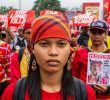MANILA — The passage of the anti-terror bill is expected to spur more economic and military aid for the Arroyo government, in exchange for deepening its involvement in the US-led �War on Terror� and protecting America�s economic stake in the Philippines, says independent think-tank IBON Foundation.
Historically, US assistance to the Philippines had been directly affected by government decisions that impact on American geopolitical or economic interests. For instance, the Senate rejection of the extension of the Military Bases Agreement in 1990 set off the annual downfall in US aid to the country until the Visiting Forces Agreement (VFA) was approved by the Senate in 1998 and reversed the downward trend in US aid. The sharpest increases in US aid happened after 9/11, with US military assistance to the Philippines growing by an overwhelming 1,639% between 2001 and 2002.
Such aid allows the US to pursue its economic and military agenda in the country. An anti-terror law would make it easier to pacify groups opposed to the US agenda by dubbing them as �terrorists� and curtailing their civil rights as well as levying harsh penalties on them.
Such a law also complements Arroyo�s total war policy against the CPP-NPA etc, dubbed a foreign terrorist organization by the US State Department. With US guidance, the counter-insurgency war under Arroyo is capped by a widespread assassination campaign targeting leaders of progressive groups and human rights activists. This campaign parallels the Central Intelligence Agency-undertaken Operation Phoenix in Vietnam, which was designed to identify and �neutralize� the non-combatant infrastructure of Vietcong cadres in South Vietnamese villages. (Ibon Foundation)
Terrorism









